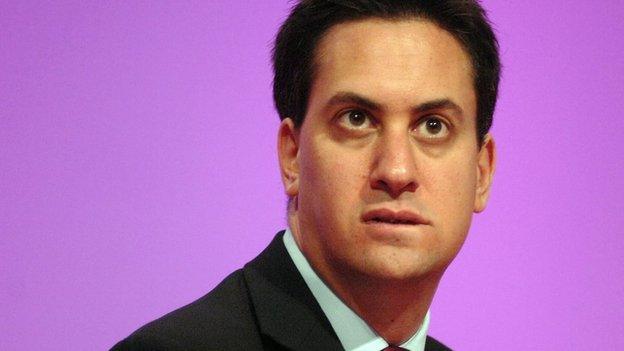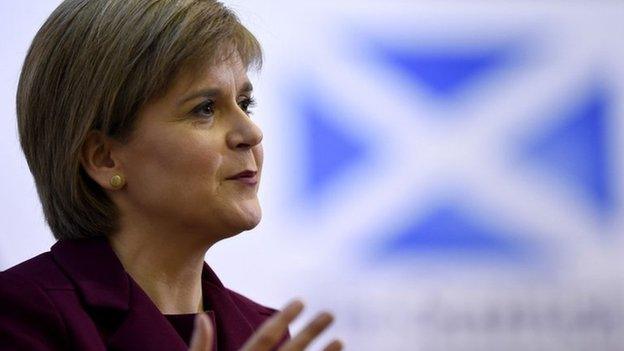Talk of SNP deal will dog Miliband
- Published

Ed Miliband might have to rely on SNP support to form a government
Conservatives in Westminster believe they are on to something.
English MPs suggest voters in marginal constituencies hate the idea of Scottish Nationalist MPs dictating their futures.
So as Prime Minister's Questions demonstrated in a noisily grisly session on Wednesday, David Cameron will try to ram in a reference to the supposed 'deal' between Labour and the SNP at every possible opportunity.
Whether that is based on actual fact is quite another question.
At this stage the idea of any formal arrangement with the SNP makes most Labour MPs snort.
The long-held hostility and recent bitterness over the referendum makes them working together seem fanciful.
One well-placed Labour MP told me this week: "We will rule it out eventually, they hate us and we hate them."
So why does Ed Miliband not just say simply, it won't happen? He and his colleagues on Wednesday, when asked repeatedly, can't quite form the words.
One source close to the leadership has - in the way only Westminster creates these bizarre scenarios - just ruled out ruling it out.
Coalition likely
So why not? First, the arithmetic.
This is the most unpredictable election in many years.
What does appears certain is that the SNP will gain a slew of seats at Labour's expense.
Ed Miliband is unlikely to win the election outright. So if he has any hope of getting a government together, he is likely to need the nationalists' support.
So, while it is a long way short of signing any kind of pact, Labour cannot deny that they would potentially ask for Nationalist backing on particular issues to get anything done.
For their part, the SNP is delighting in reminding us there is a potential offer on the table.

Nicola Sturgeon's party is expected to make significant gains in May
Their leader in Westminster Angus Robertson said on Wednesday: "If the numbers are such that the Labour Party cannot command a majority they will have to work with the SNP."
But there is a bigger line that Labour is trying to hold.
If the party makes a categoric statement ruling out working with the SNP, what happens next?
The fear is they would have to indulge a giant Westminster parlour game about who would play with who, and rather than concentrate on trying to get their own message out the party leaders would get stuck answering endless hypothetical questions.
What about working with the Lib Dems? What about working with the Greens?
One member of the Shadow Cabinet suggested "we're not going to fall for that" - but wondered aloud why the Conservatives hadn't been yet pressed on a similar question on their attitude to working once more with the Lib Dems.
Another dismissed what's going on as just "a silly game".
But Labour's difficulty is the Tories believe the charge has traction, and the SNP is enjoying every moment.
Refusing to get involved in a conversation doesn't always silence your opponents.
UPDATE:
Labour doesn't want to talk about the political realities but sources suggest the Commons authorities are taking the practical realities of big gains for the SNP very seriously indeed.
In the last few weeks I'm told they have had a series of meetings with the party to discuss how they would cope with a large influx of MPs.
Conversations are being had not just about physical office space, but how a much bigger SNP might be represented on Westminster's powerful committees, whether they would be able even to have one of their representatives in charge of one, in the chair.
Of course we won't know how the SNP poll surge translates into actual seats until 8 May, but this preparation suggests Parliament's authorities are preparing carefully for the prospect of them becoming the third biggest party - unthinkable a few months ago, now being discussed as a realistic possibility.